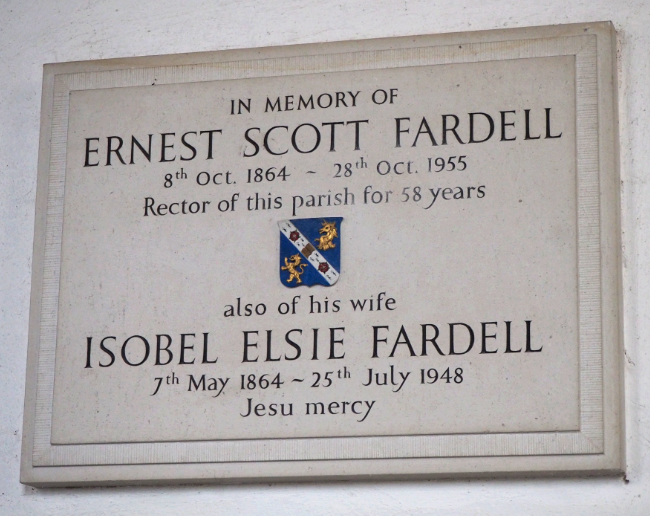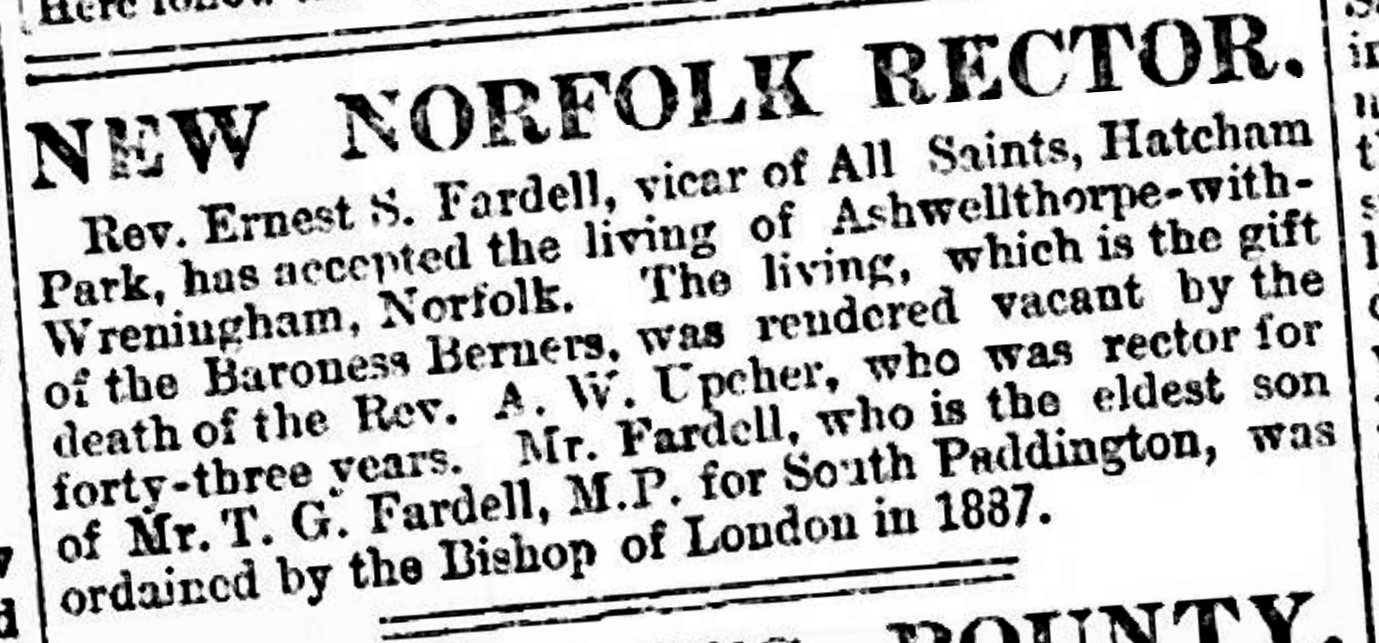
Canon Ernest Scott Fardell was one of the longest serving Rectors of Wreningham church – at 58 years.
Appointed in September 1896, following the death of Rev A W Upcher, he took up residence, at the rectory, with his wife, Isobel, and their two young sons. His father, Sir Thomas George Fardell, was the Member of Parliament for Paddington.
Eventually, an honorary Canon, the Rev Ernest Fardell may well have introduced our first local church magazines.
He certainly appears to have hit the ground running. In his initial years in Wreningham, the church was re-roofed and the village school greatly enlarged. Each was a major task and both required the raising of a considerable amount of money.
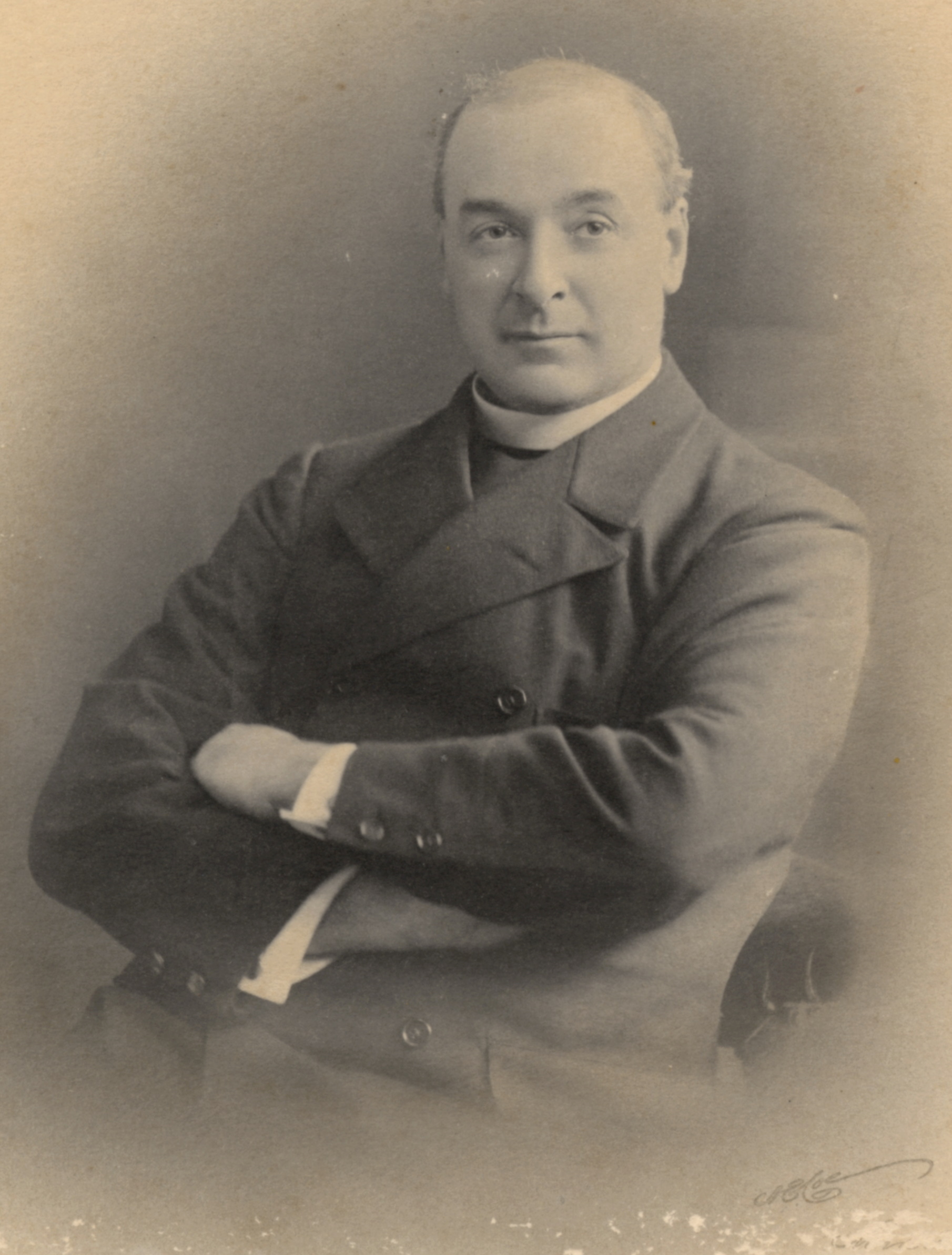
Robert Dennis Day’s ledger shows that in March 1897, soon after arriving in Wreningham, Mrs Fardell bought a canary from him for 6s.
This was followed by a “breeding cage” with “3 compartments” which cost the Fardells 12s 6d.
Presumably, they already owned other canaries because one bird wasn’t going to be enough …..
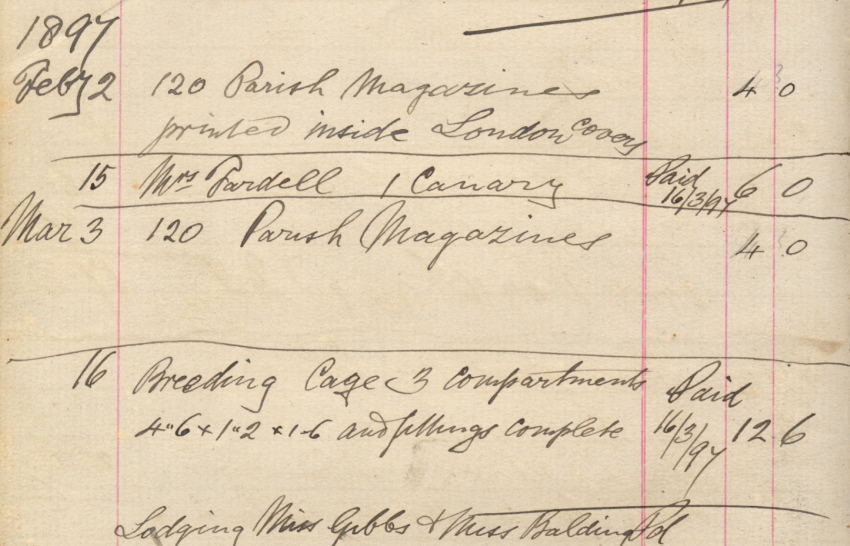
The Fardell family had arrived in Wreningham with their young boys: Denys and Kenneth. They engaged a governess, Harriett Hopkins, from Glamorganshire. Harriett initially lived at the Rectory but she purchased the north half of Rose Cottage, in Ashwellthorpe Road in late 1903, following the death of the previous owner, Rebecca Bush. Harriett appears to have maintained her day-time role at the Rectory and she eventually shared her new home with two sisters who arrived to join her in Wreningham. The Hopkins sisters are understood to have contributed to the school and Harriett eventually bequeathed her estate to Wreningham church.
A Greek and Latin scholar, the Rev Fardell engaged with the Norwich Diocese and was soon appointed general secretary on one of the Norwich Diocese schools committees.
He also appears to have encouraged residents to take part in sport at the Rectory field. In 1901, R D Day supplied him with a copy of Croquet Regulations (1s) and the following year, with a copy of the Lawn Tennis Rules (2s 6d). Tennis was played on the Rectory lawn for many years (link). The Rev Fardell also oversaw the Reading Room, which might have broadened his reach within the community.
Rev Fardell was responsible for the upkeep of the Church, the Rectory, the School and the provision of Church magazines. R D Day provided his own services in connection with each of these. Here is an extract dated from his ledger in April 1901 giving a summary of the rector’s account broken down under its various headings.
Individual costed tasks are listed on the ledger’s preceding pages.
The first R D Day references to Church magazines was in 1897 and they started at 120 copies per month but soon increased to 170 per month. These would have been distributed in both Wreningham and Ashwellthorpe.
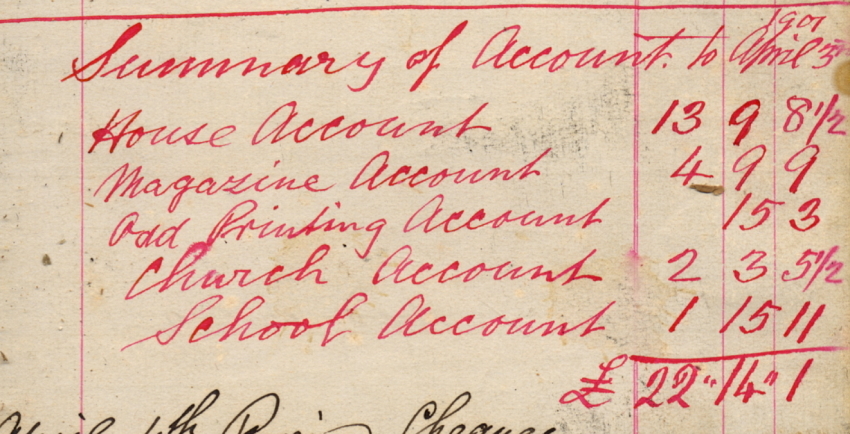
The repairs to the church roof, in 1905, resulted in the church being closed for three months and at a cost of £350; all of this money had needed to be raised locally. When taking into account the £600 which had just been collected for enlarging the school, it is a considerable achievement that, during the same year, the rector was able to announce the church was entirely free of debt.
The Rev Fardell was eventually given the honorary title of Canon Fardell, by the Diocese – which is the title by which he is now remembered.
Rectors were recruited by established groups or organisations. In rural areas the rector’s employment was called a “living” because it came with a funding from tithes – which were a local tax. Before 1894, when independent parish councils were introduced, the rector also headed the Vestry – which gave him control of the local administration – although these powers diminished during the 1800s. In the case of Wreningham (with Ashwellthorpe) the selection and appointment of the rector fell to the Manor.
The tithe system involved the rector billing the residents each year. Here is an example of one of the invoices the Rev Fardell sent out – in this case to John Bullimore in October 1901. John Bullimore was being billed for £20 0s 11d – a relatively large sum, but John Bullimore did own a lot of property. Note: the document describes “Multimer” as the tenant farmer.
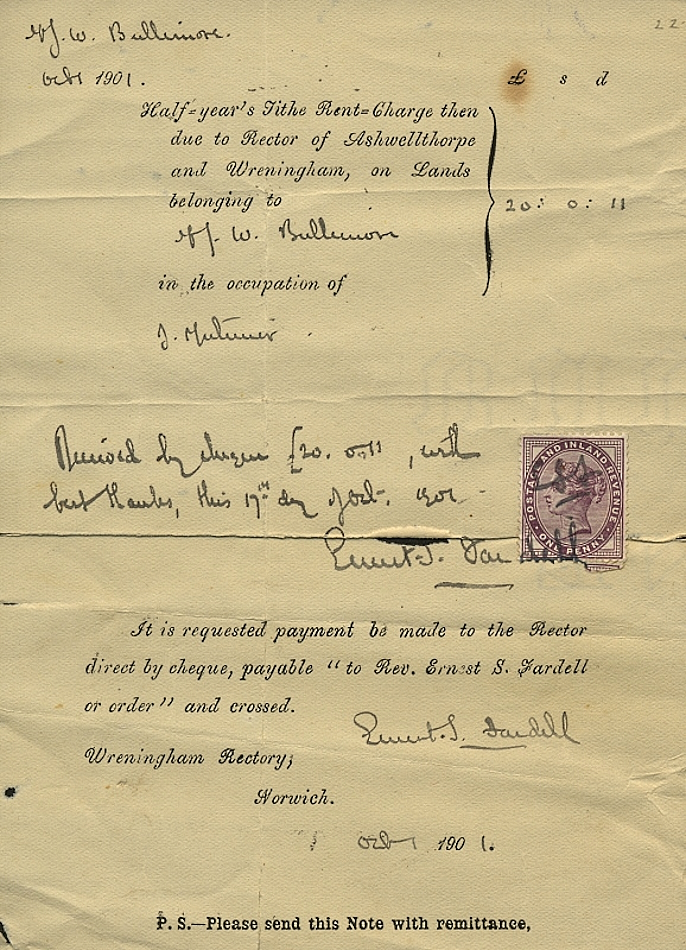
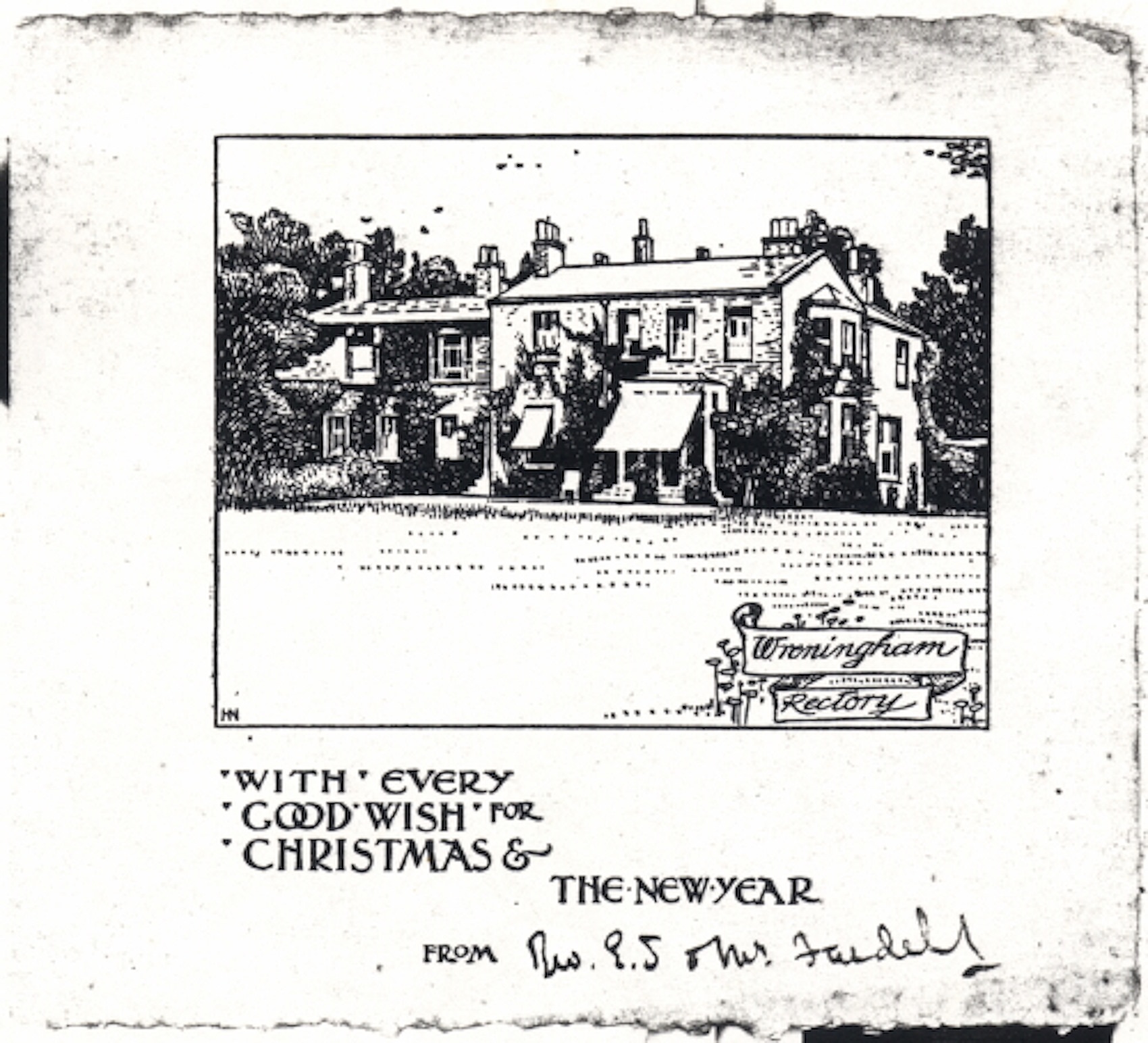
Judging by R D Day’s ledger, Christmas Cards were “a thing” in this area from the late 1800s. In fact, Robert Dennis Day appears to have been printing many village Christmas Cards – and they were always ordered by the ladies of the household!
Here is a card from the Rectory, sent out by the Fardells. The year isn’t recorded – and we have no idea who printed it!
The 1910 handbook for the Norfolk Miniature Rifle Association lists the Rev Canon Fardell as the point of contact for “Wreningham and District”. There is no reference to any active involvement.
Canon Fardell’s son, Kenneth, joined the Royal Navy – and, in 1932, he officiated at Lt Cdr K M Fardell’s marriage to Avis Crosse, in London. However, in 1915, Canon Fardell wrote a letter of complaint to the First Lord of the Admiralty (then, Winston Churchill) protesting about the expenses of shipping the gear of his son, Lieut K M Fardell RN, from the China Station to Britain at the outbreak of war. Clearly, Canon Fardell considered this was a cost which should be born by the state. A note on the Admiralty file confirmed the expenses would be met. The correspondence now resides in the Churchill Archive.
Cider Making and Canon Fardell
Canon Fardell died in October 1955. The funeral service was presided over by the Bishop of Norwich, Bishop Herbert.
Ernest Scott Fardell and his wife, Isobel, who pre-deceased him, are buried in Wreningham churchyard.
The next rector was the Rev J B Gordon.
